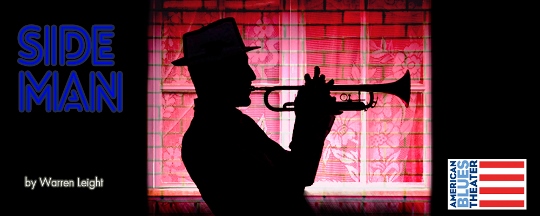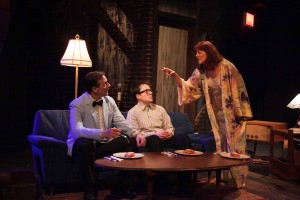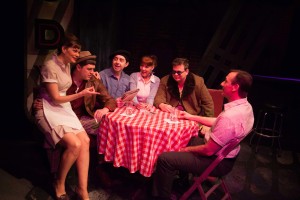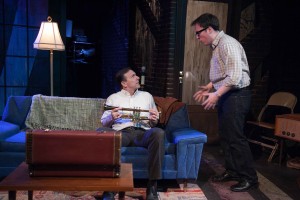BLUES IN THE NIGHT
Side Man is a superb title. It fits the story/situation splendidly. Warren Leight’s 1999 Tony-winning memory play is narrated by a son named Clifford, its subject his jazz musician dad Gene and his hardluck mother Terry. Moving laterally from gig to gig, prospering only between Sinatra and Elvis, Gene’s only musical triumph was misattributed to a horn man who quit the business. This temporary trumpeter was never a featured player with a name band: He could play anything, which meant nothing special, just the music and the guys with whom he made it, who were mainly happy only then. To everything else he was “oblivious” and, like soldiers in a fox hole, he did it for his band of brothers–in jazz.
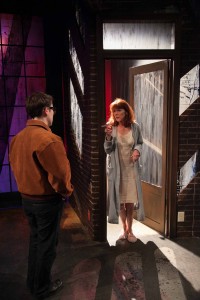 But across the 50s and 60s, making music delivered a lot more than he got from his miserable marriage with Terry. Holding it together was Clifford, a peacemaking son from a toxically dysfunctional family. This damaged kid can only arrange truces in the endless disappointment that bonds his passive and anti-ambitious father with the alcoholic mother who bitterly believed in a promise that Gene never—well—promised.
But across the 50s and 60s, making music delivered a lot more than he got from his miserable marriage with Terry. Holding it together was Clifford, a peacemaking son from a toxically dysfunctional family. This damaged kid can only arrange truces in the endless disappointment that bonds his passive and anti-ambitious father with the alcoholic mother who bitterly believed in a promise that Gene never—well—promised.
Leight’s bittersweet retrospective plays like riffs in a jazz improvisation, just the way memories create their own disjointed melody line. Jonathan Berry’s pitch-perfect staging captures every note, mostly minor. It helps immensely that Leight delivers this world completely, offering torn snapshots from a battered family album: These underused music-makers visit the unemployment office so often they call it “Club 92.” Bouncing from the elegance of the Paramount ballroom to the tawdry Melody Lounge where they “burn brass,” these Bronx boys are trapped in a demi-monde or Hobohemia of casual heroin injections (“addicts but never junkies”), multiple marriages, backroom boozing, chain-smoking, and the occasional blazing glory of a solo where everything turns sweet and real.
The scene of Gene and Terry’s first and only date is as believable and focused as any theatrical eavesdropping can allow. Clifford could know nothing of this major meeting—or how his arrival started his parents’ tailspin until Clifford’s wry theme song becomes “Why Was I Born?” Even his name connotes failure–it was supposed to be “Francis Albert” but then Gene got into a snit with Old Blue Eyes and he became just Clifford.
Trapped in the “twilight of a mediocre career,” Gene–devastatingly reduced to everything but his instrument by Michael Ehlers–is afraid that success might ruin the reason he plays his horn. He drifts when his wife wants him to drive. Eventually, his worst nightmare comes true: He can’t get a gig on a Saturday night. This is unforgivable to Terry (Kate Buddeke. awesomely mutating from a hopeful Doris Day to a shrewish Shelley Winters). Having her first drink on her wedding night is a bad portent of many more to come. Terry is a hard-boiled, tough-loving East Boston Italian girl who, hitting Gene as much as the bottle, slowly breaks down until she’s arrested walking nude down Amsterdam Avenue. (Well, there was always that one happy memory when she imagined that her hurt hand was healed by one of Wilhelm Reich’s “orgone boxes”—until she threw out this supposedly obscene invention.) Grit and spite fuel thirty years of squabbles between Ehlers’ feckless, infuriatingly childlike Gene and Buddeke’s sodden spitfire Terry. They’re too real to sit in the first two rows.
With seeming total recall, Clifford introduces us to the paltry role models who were a side man’s side men. Trapped in a very un-exotic hothouse, they’re itinerant scroungers and survivors, marginalized even in their music. We meet much-marrying lady’s man and lead player Al (John Gawlik); one-eyed trombonist and hophead Jonesy (Joe Foust), who hits the skids and never lets up; and Ziggy (Edward Kross), the one player who realizes just how much a certain Elvis has doomed their way of art. (For them everything changes but the music and, unfortunately, it doesn’t change enough to last.) Finally, there’s goodtime girl and full-time waitress Patsy (Gail Rastorfer as natural as a nightcap) who remembers enough to forgive a lot.
Caught in the crossfire and pushed to take sides, Clifford (Michael Mahler, providing equilibrium to extreme events and dangerous dreams) must evict his father from an apartment that’s as improvised as the music: Terry can’t live with Gene, and his mom will go to the wrong kind of home if she can’t move back to their broken one. Finally, like Tom in Glass Menagerie (which Side Man resembles in all the right ways), Clifford has to leave to pursue his dreams as a painter far from Manhattan.
I don’t want to call the work—or play—of American Blues Theatre ensemble “acting.” That’s a term you can only use after it’s over. Adding a stylized backdrop are set designer Sarah Ross’ jagged urban walls and windows, forlorn illustrations of the once ritzy neighborhood. Then there’s the jazz music itself, the sounds that explain even more than Leight does. (There will be guest performers playing for 15 minutes before each performance.) You feel the price they paid for the sounds we love. There’s blood on these notes.
photos by Johnny Knight
Side Man
American Blues Theater
Greenhouse Theater Center, 2257 N. Lincoln
Thurs-Sat at 7:30; Sun at 2:30
ends on May 24, 2015
for tickets, call 773.404.7336 or visit www.AmericanBluesTheater.com
for info on Chicago Theater, visit www.TheatreinChicago.com
